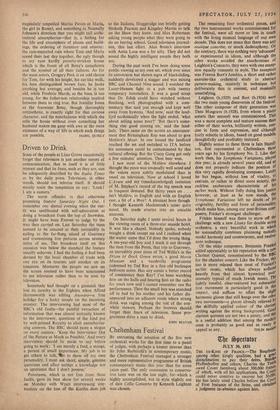Driven to Drink
SOME of the people at Lime Grove occasionally forget that television is just another means of communication; that in itself it is of little interest and that its feats, such as they are, can be adequately described by the Radio Times or by the daily press. Television, in other words, should not televise itself. It should sternly resist the temptation to say: 'Look! 1 am a camera.'
The worst offender is that otherwise promising feature Saturday Night Out. I remember one dismal evening when the out- fit was spellbound with self-admiration at doing a broadcast from the top of Snowdon. It might have been Everest to judge by the way they carried on, Last Saturday the team seemed to be 'amazed at their intrepidity in sailing to the far-flung island of Guernsey and transmitting live pictures across seventy miles of sea. The broadcast itself on this occasion was below the standard the feature usually achieves. I had the feeling it had been devised by the local chamber of trade with one eye on its tourists and another on its tomatoes. Moreover the people we saw on the screen seemed to have been summoned to see television rather than to be seen by television.
Somebody had thought up a gimmick that lost its novelty in the Eighties when Alfred Harmsworth was editing Answers—a free holiday for a lucky couple on the incoming steamer. The interviewing had most of the BBC's old faults—the painful extraction of information that was almost certainly known to the interviewer, questions of the kind put by well-primed Royalty to elicit unembarras- sing answers. The BBC should paste a slogan on every camera : 'Keep the Interviewer Out of the Picture as Much as Possible.' And every interviewer should be made to say before going to work: 'I am merely a feed, a stooge, a person of small importance. My job is to get others to talk, tot to show off my own personality. I must ask short, simple, genuine questions and affect neither a knowledge nor an ignorance that I don't possess.' to the Italians, Muggeridge too briefly getting Hesketh Pearson and Kingsley Martin to talk on the Shaw they knew, and Max Robertson asking young people what they were going to do on leaving school. Good television journal- ism, this last effort. Alan Brien's interview with Anita Loos was a bit silly. They did not sound the highly intelligent people they both are.
During the past week I've been doing some public viewing as my own set, which ever since its conversion has shown signs of blacksliding, suddenly developed a stagger and was mixing BBC and Channel Nine sound. I watched the Lazar-Hansen fight in a pub with twenty temporary teetotallers. It was a good scrap that Dr. Edith could have watched without flinching, well photographed with a com- mentary that said just enough and kept well away from hysteria. 'And now,' said the land- lord sardonically when the fight ended, 'what about selling some beer?' But there's some- thing else good corning on,' said the land- lady. There came on the screen an announce- ment that Birmingham Rep was about to give Moliere's Miser. In one bound the landlord reached the set and switched to ITA before his customers could be contaminated by this cultural offering. But the Crazy Gang got only a few minutes' attention. Then beer won.
I saw most of the Moliere elsewhere. I thought the piece was unusually well acted and the voices more subtly modulated than is usual on television. Now at school I loved L'Avare and my (unacknowledged) imitation of M. Stephan's record of the big speech was in frequent demand. But thirty. years on . . . isn't Moliere, in English and with an English cast, a bit of a bbre? A pleasant bore though. I thought Kenneth Mackintosh's miser quite novel. He made avarice into an amiable neurosis.
On Saturday night I spent several hours in the viewing room of a three-star seaside hotel. It was like a chapel. Nobody spoke, nobody bought a drink except me and I realised when the waiter came that I'd done the wrong thing. A ten-year-old boy and I stuck it out through the item from the Prom, that trip to Guernsey, an incredibly poor piece of Ted Willis's in the Dixon 6f Dock Green series, a good Movie Museum and a vaudeville programme redeemed by Ted Ray in a fine old burlesque bedroom scene. Has any comic a better record of consistency than Ray? I've been watching him on the halls and hearing him on the radio for years now and I cannot remember one flat performance. Then the small boy was snatched off to bed by his mother and his father dis- appeared into an adjacent room where strong drink was raging among the rest of the erst- while viewers. Perhaps the brewers should forget their fears of television. Some pro- grammes drive a man to drink.
JOHN BEAVAN


































 Previous page
Previous page